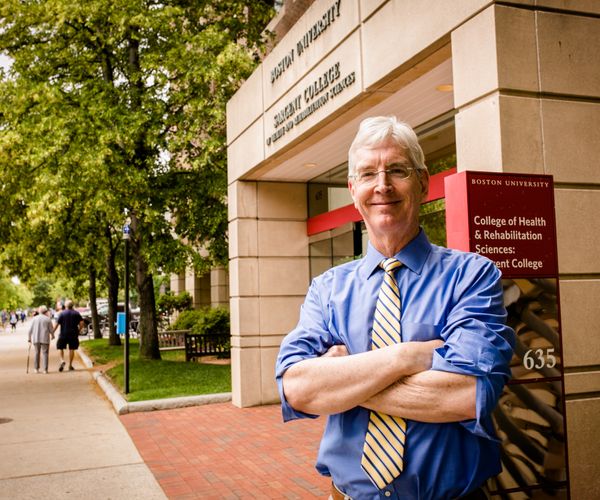Dear Friends,
As we settle into another fall semester, we have even more than usual to be grateful for. After a year full of challenges, Sargent has returned to almost normal operations while continuing to take all prudent precautions to safeguard everyone’s health and safety. Students are back learning in the classrooms, conducting research in the labs, and studying state-of-the-science practices in our clinics. Boston University’s vibrant residential community is thriving.
This year, we commemorate the 140th anniversary of the founding of Sargent College. It’s a particularly fitting moment in history to celebrate Dudley Allen Sargent’s legacy of inclusion and participation for all. A pioneer in the study of physical training and exercise, our founder was a century ahead of his time in his advocacy for everyone’s right to participate fully in their own lives, regardless of ability, gender, or race—and we continue to foster this spirit today.
“A pioneer in the study of physical training and exercise, our founder was a century ahead of his time in his advocacy for everyone’s right to participate fully in their own lives, regardless of ability, gender, or race.”
One way we’ve done this is through our focus on sustained health, maximizing every person’s participation in life by supporting their healthcare objectives. I’m particularly proud of the way this issue of Inside Sargent highlights how our award-winning faculty further this commitment. Speech-language pathologist Jennifer Zuk is researching early screening methods for children at risk for dyslexia, while neuroscientist Claudio Ferre explores how cutting-edge fNIRS technology can help children with cerebral palsy develop and improve their motor skills. Focused on a different phase of the life span, Jennifer Kaldenberg, an occupational therapist, uses iPads to help adults with low vision complete activities of daily living. And Deepak Kumar is using wearable sensors to develop improved physical therapy treatments for people with knee osteoarthritis. You’ll also read about treating low back pain, helping transgender men adjust their vocal pitch, and using nutrition as medicine—all areas where our faculty’s research and clinical expertise improves quality of life.
Sustaining and maximizing health throughout the life span is certainly a complex challenge. There is a lack of adequate research-based evidence in many areas, which can lead to the persistence of unproven or outdated treatments. Our clinical scientists are seeking new answers to these challenges by mining the enormous reservoir of evidence being amassed in the electronic medical records of patients across the nation. And most disturbing, there is the inequitable distribution of healthcare resources—disparities on which the pandemic shined a painful spotlight. As we continue our efforts to counter the pernicious effects of the pandemic, we must remember that the public health crisis continues in many places where access to vaccines and testing is limited or rejected. Lawrence Were, an assistant professor of health sciences, is working on this problem with colleagues in Africa by creating and implementing data-driven solutions to address inequities in access to vaccinations and treatment.
Tackling these challenges requires clinicians to work even more closely and effectively across disciplines with updated health policies and systems to support their patients’ ambitions. We’ll continue to lead our disciplines toward achieving these goals and creating a more equitable healthcare system.
Finally, after 18 months of Zoom and online connections, I can’t wait to resume our in-person events, lectures, and meetings at Sargent and across the country, and look forward to seeing you then!
Warmly,

Christopher A. Moore
Dean and Professor
